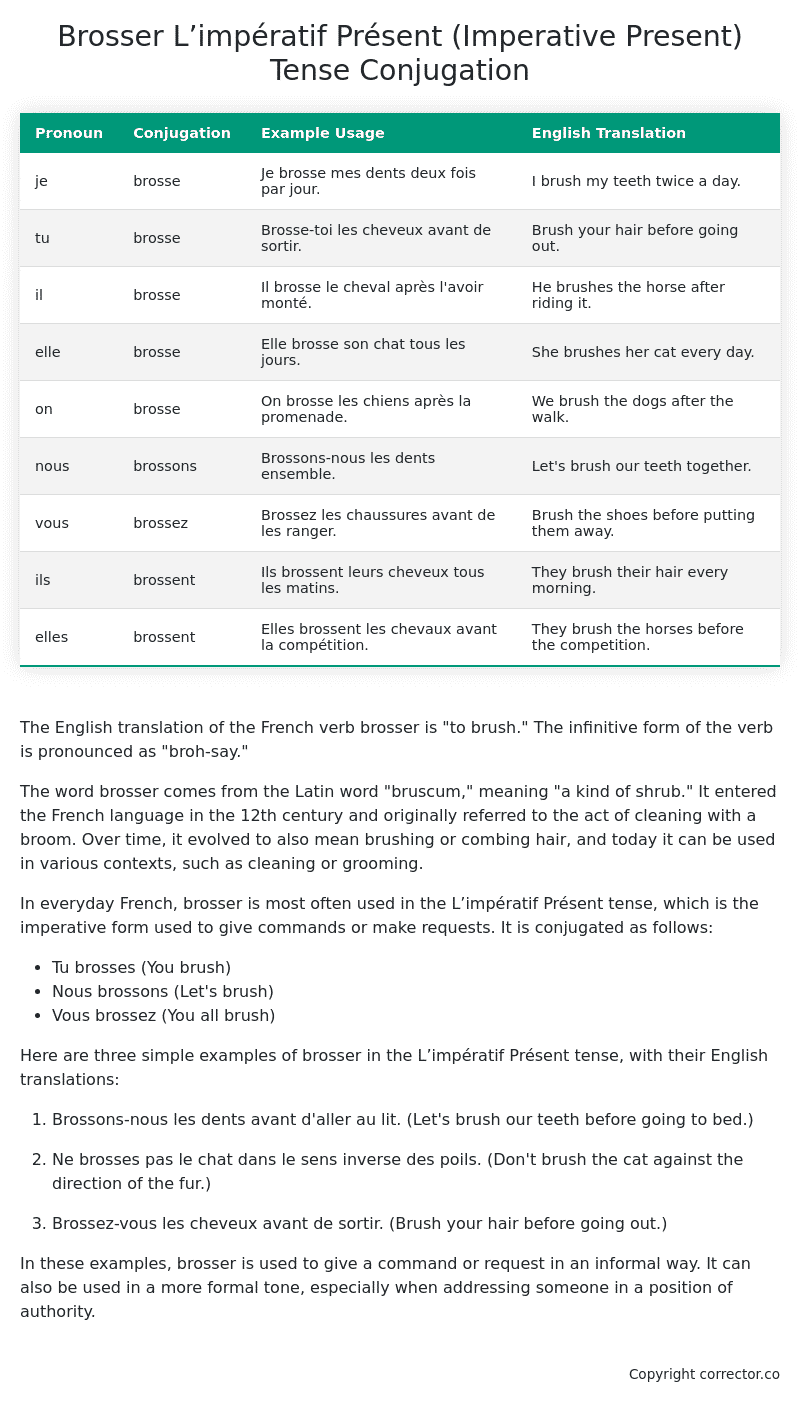L’impératif Présent (Imperative Present) Tense Conjugation of the French Verb brosser
Introduction to the verb brosser
The English translation of the French verb brosser is “to brush.” The infinitive form of the verb is pronounced as “broh-say.”
The word brosser comes from the Latin word “bruscum,” meaning “a kind of shrub.” It entered the French language in the 12th century and originally referred to the act of cleaning with a broom. Over time, it evolved to also mean brushing or combing hair, and today it can be used in various contexts, such as cleaning or grooming.
In everyday French, brosser is most often used in the L’impératif Présent tense, which is the imperative form used to give commands or make requests. It is conjugated as follows:
- Tu brosses (You brush)
- Nous brossons (Let’s brush)
- Vous brossez (You all brush)
Here are three simple examples of brosser in the L’impératif Présent tense, with their English translations:
-
Brossons-nous les dents avant d’aller au lit. (Let’s brush our teeth before going to bed.)
-
Ne brosses pas le chat dans le sens inverse des poils. (Don’t brush the cat against the direction of the fur.)
-
Brossez-vous les cheveux avant de sortir. (Brush your hair before going out.)
In these examples, brosser is used to give a command or request in an informal way. It can also be used in a more formal tone, especially when addressing someone in a position of authority.
Table of the L’impératif Présent (Imperative Present) Tense Conjugation of brosser
| Pronoun | Conjugation | Example Usage | English Translation |
|---|---|---|---|
| je | brosse | Je brosse mes dents deux fois par jour. | I brush my teeth twice a day. |
| tu | brosse | Brosse-toi les cheveux avant de sortir. | Brush your hair before going out. |
| il | brosse | Il brosse le cheval après l’avoir monté. | He brushes the horse after riding it. |
| elle | brosse | Elle brosse son chat tous les jours. | She brushes her cat every day. |
| on | brosse | On brosse les chiens après la promenade. | We brush the dogs after the walk. |
| nous | brossons | Brossons-nous les dents ensemble. | Let’s brush our teeth together. |
| vous | brossez | Brossez les chaussures avant de les ranger. | Brush the shoes before putting them away. |
| ils | brossent | Ils brossent leurs cheveux tous les matins. | They brush their hair every morning. |
| elles | brossent | Elles brossent les chevaux avant la compétition. | They brush the horses before the competition. |
Other Conjugations for Brosser.
Le Present (Present Tense) Conjugation of the French Verb brosser
Imparfait (Imperfect) Tense Conjugation of the French Verb brosser
Passé Simple (Simple Past) Tense Conjugation of the French Verb brosser
Passé Composé (Present Perfect) Tense Conjugation of the French Verb brosser
Futur Simple (Simple Future) Tense Conjugation of the French Verb brosser
Futur Proche (Near Future) Tense Conjugation of the French Verb brosser
Plus-que-parfait (Pluperfect) Tense Conjugation of the French Verb brosser
Passé Antérieur (Past Anterior) Tense Conjugation of the French Verb brosser
Futur Antérieur (Future Anterior) Tense Conjugation of the French Verb brosser
Subjonctif Présent (Subjunctive Present) Tense Conjugation of the French Verb brosser
Subjonctif Passé (Subjunctive Past) Tense Conjugation of the French Verb brosser
Subjonctif Imparfait (Subjunctive Imperfect) Tense Conjugation of the French Verb brosser
Subjonctif Plus-que-parfait (Subjunctive Pluperfect) Tense Conjugation of the French Verb brosser
Conditionnel Présent (Conditional Present) Tense Conjugation of the French Verb brosser
Conditionnel Passé (Conditional Past) Tense Conjugation of the French Verb brosser
L’impératif Présent (Imperative Present) Tense Conjugation of the French Verb brosser (this article)
L’infinitif Présent (Infinitive Present) Tense Conjugation of the French Verb brosser
Struggling with French verbs or the language in general? Why not use our free French Grammar Checker – no registration required!
Get a FREE Download Study Sheet of this Conjugation 🔥
Simply right click the image below, click “save image” and get your free reference for the brosser L’impératif Présent tense conjugation!

Brosser – About the French L’impératif Présent (Imperative Present) Tense
Usage
Giving commands
Making requests
Offering advice
Expressing desires
Conjugation Formation
Interactions with other tenses
Want More?
I hope you enjoyed this article on the verb brosser. Still in a learning mood? Check out another TOTALLY random French verb conjugation!


